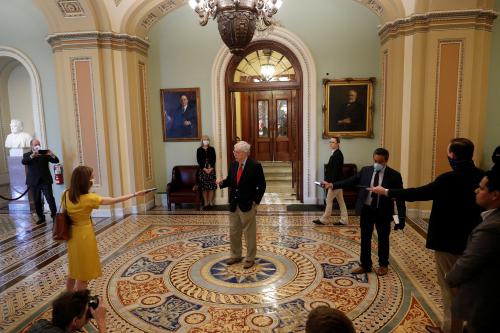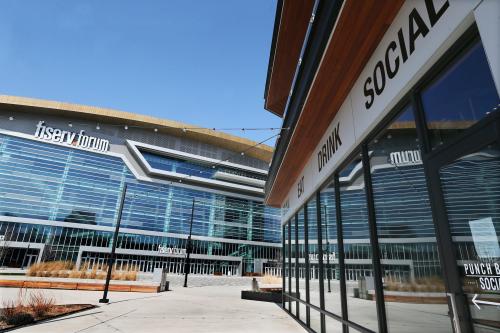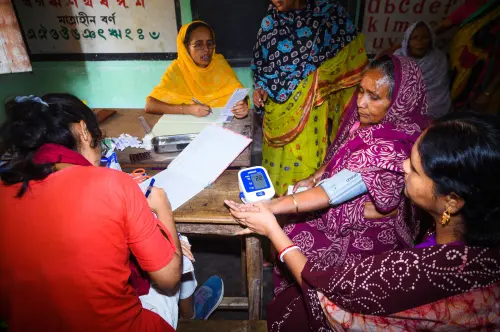Like thousands of other college professors, we have had to rapidly transition our teaching online in response to the COVID-19 crisis. We are scrambling to leverage the internet to achieve our teaching objectives and to support our students in these trying times. Members of Congress must do something very similar: use the internet to discharge their democratic duties and support their constituents. Our research on online deliberative town halls shows how they can.
In response to social distancing orders, members of Congress are quickly switching to online engagement for reaching out to constituents and providing information about the COVID-19 pandemic. Unfortunately, members risk cementing bad practices as they are adapting their outreach to fit the constraints and habits of existing social media services. In doing so, they may create a perception among their constituents—and even among themselves—that online engagement is unsatisfying and unconstructive, which in turn risks a setback in the use of technology to make democracy more robust.
Our need for public-oriented technology to support the representative functions of government extends beyond the immediate crisis. Even before the pandemic, democratic institutions in the U.S. were facing long-term declines in trust and legitimacy. Congress needs an online platform specifically designed to facilitate constructive constituent engagement. Properly conceived, technology can empower individuals to have their voices heard at scale, which in turn can help arrest these long-term negative trends and reconnect constituents directly to their government.
These days it is hard for individuals to feel like their voices are heard on important policies. There really are not many places where ordinary people can go to express their views directly to their elected representatives. As a result, ordinary people feel disconnected from our democracy, and feel that their voice is not heard the same way that lobbyists and activists get heard. At the same time, elected officials want more informed and robust input and interactions with constituents, but there is likewise nowhere for them to turn to routinely engage in direct, informed, and constructive dialog with a broad cross-section of their constituents. The result, as recent research highlights, is that Congressional offices are poorly informed about the policy preferences of their broader constituency.
About a decade ago, in collaboration with the Congressional Management Foundation, our research team received a grant from the National Science Foundation to tackle this problem. We worked with members of the U.S. Congress to develop best practices for online constituent engagement. Our goal was to mitigate democracy’s problem of communication at scale by developing practices that can facilitate online deliberative town hall meetings between elected officials and their constituents. Such practices can give individuals a direct voice in policymaking and elected officials direct access to constituents.
Our research team recently published a book on our findings, “Politics with the People: Building a Directly Representative Democracy“. In it we provide recommendations for designing a good online town hall. The book describes our model which enables constituents to have direct, substantive, and meaningful discussions with their elected officials. We designed the town hall to create a space that is conducive to reasoned discussion and a more deliberative democracy. The design relies on five important elements:
- Attract a diverse cross section of the constituents that is as representative of the district as possible. In addition to supporting equality, this design element ensures that participants are not confined within echo chambers that reinforce existing views, but instead get to engage diverse views and perspectives.
- Focus the town hall on a single topic. Discussing a single topic for an extended period ensures that both elected officials and constituents move beyond talking points to more substantive and nuanced discussion of the full complexity of the topic.
- Provide balanced, factual reading material on the topic prior to the event. Providing reading material ensures that all constituents can feel empowered to participate effectively based on factual evidence.
- Have a neutral, trusted third party host and moderate the event. Third party moderators can foster trust that the elected official will move beyond softball questions and scripted responses to address topics that are challenging and important. The moderator also can ensure that all participants have an equal opportunity to ask questions and engage.
- Have the elected official present in the session through streaming video and audio. When the elected official participates in this direct way, participants can authenticate that the official herself is engaged, rather than a staffer or other delegate. This helps to confirm that the member is engaged and that the constituents have a direct connection to elected officials and a voice in the representative process.
Our research demonstrates that online deliberative town halls, based on these principles, resulted in better informed citizens and members of Congress; increased trust in the member; and increased voter turnout. A remarkable 95% of participants said that events like this are “very important to our democracy” and 97% said they would like to do another. Doing democracy well is good politics.
Richard Fenno noted that the constitutional designation for members of the House is representative, not congressman. He went on to observe, “Whereas ‘congressman’ or ‘congresswoman’ tends to call our attention to a House member’s Capitol Hill activities and to his or her relationship with colleagues, ‘representative’ points us toward a House member’s activities in his or her home district and to relationships with constituents.” That role as representative is more important than ever in this moment of crisis, and we need creative measures to sustain those relationships between members and their constituents. Online deliberative town halls offer a means to do this; and the result, we believe, will be a stronger democracy long after the virus recedes.
The Brookings Institution is committed to quality, independence, and impact.
We are supported by a diverse array of funders. In line with our values and policies, each Brookings publication represents the sole views of its author(s).







Commentary
Congress must stay connected even in a time of social distancing
May 20, 2020